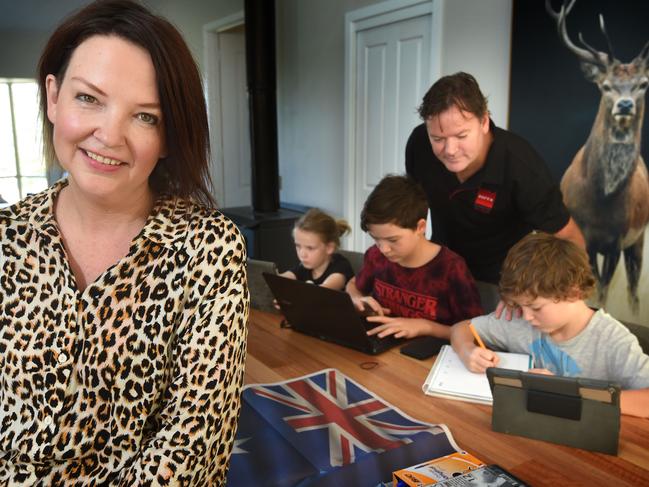How parents can homeschool their kids without stressing out with expert tips
Parents need to know it’s OK if they cannot squeeze parenting, ‘teaching’ and working all into the same day. There are simple ways to still teach kids without adding more pressure.
Hibernation
Don't miss out on the headlines from Hibernation. Followed categories will be added to My News.
There is a very big difference between home schooling and the schooling that is occurring during lockdowns and that difference is the role of the parent.
Distance or home learning, which has happening in virtually every state and territory in Australia, is where skilled and trained teachers set the work and the students complete it remotely. The key factor often overlooked is that the implementation is falling squarely on the parents themselves.
And unlike traditional home schooling, in distance learning the parent is trying to squeeze parenting, ‘teaching’ and working all into the same day.
With students now learning remotely and parents either working from home, seeking work or struggling to navigate through the coronavirus crisis, parents are trying to balance work and their children’s education and feeling the twin pressures of guilt and anxiety.
Australian Catholic University’s Head of School of Education (Victoria) Dr Matthew Zbaracki said teachers did not expect parents to run their home like a classroom.
“It’s important that we recognise that parents, with or without paid jobs, will facilitate learning in very different ways at home and that’s OK.”

Dr Zbaracki said older primary school students can set up a question log, read a book or start on another part of their work if they need help and their parent or carer is busy.
With two children of his own, the educator said he and his wife are trying to stick as close to the school routine as possible by making all lunches and snacks the night before.
“That way they know exactly where the snacks and lunch are already made and can help themselves.”
This time of isolation is unique in many respects and one of them is that children, many for the first time, are seeing their parents in ‘work mode’ and are not used to making the transition.
Associate Professor of Educational Psychology Dr Penny Van Bergen, of Macquarie University, advised parents to have a conversation with their littlies.
“You have to let them know that you have your ‘work hat’ and give them clear guidelines so they don’t suddenly feel like the rules are changing and not understand why you are acting differently.
“They might not love it but at least they understand why you are doing it and understand you are going to switch back.”
Chief Learning Officer at Cluey Learning Dr Selina Samuels suggests all family members input their meetings into a shared calendar.
“I recommend parents prioritise the fundamental literacy and numeracy skills that are the foundations for all learning.
Dr Samuels advised to give younger students a set of instructions for what they need to do if they get stuck.
“So that you are not their first port of call. You might suggest that they read the question again, consult a dictionary, or even ask one of their friends if they are in contact with their peers.
“In the classroom, we call this C3B4ME (see three before me) and it teaches students collaboration and communication skills and how to solve their own problems.”
Allan Dougan, Global Head of Education for 3P Learning (the name behind Mathletics, Reading Eggs) said parents should remember learning is sparked by curiosity.
“Learning happens in a variety of settings and in a variety of ways. We know that we should not expect students to sit at home ‘working’ at a desk for six hours a day. Instead we want to spark their curiosity and desire for learning as well as provide opportunities to contribute to the day-to-day running of the house as appropriate, just like they would in the classroom environment. Every student has a role to play in the classroom community and this is true in the home space.”
Su Wei Tan’s family was one of hundreds last year who trialled a homeschooling program, the SolarBuddy Family program, which means students learn about energy poverty and renewable energy, and build solar lights that will be sent to children in Vanuatu.
Ms Tan said it allowd her to balance her work while knowing her child was occupied and doing something valuable.
“And it is such a strange time but by doing this we are seeing something positive and helping to make a difference,” she said.


